SUMMARY
This is AI generated summarization, which may have errors. For context, always refer to the full article.
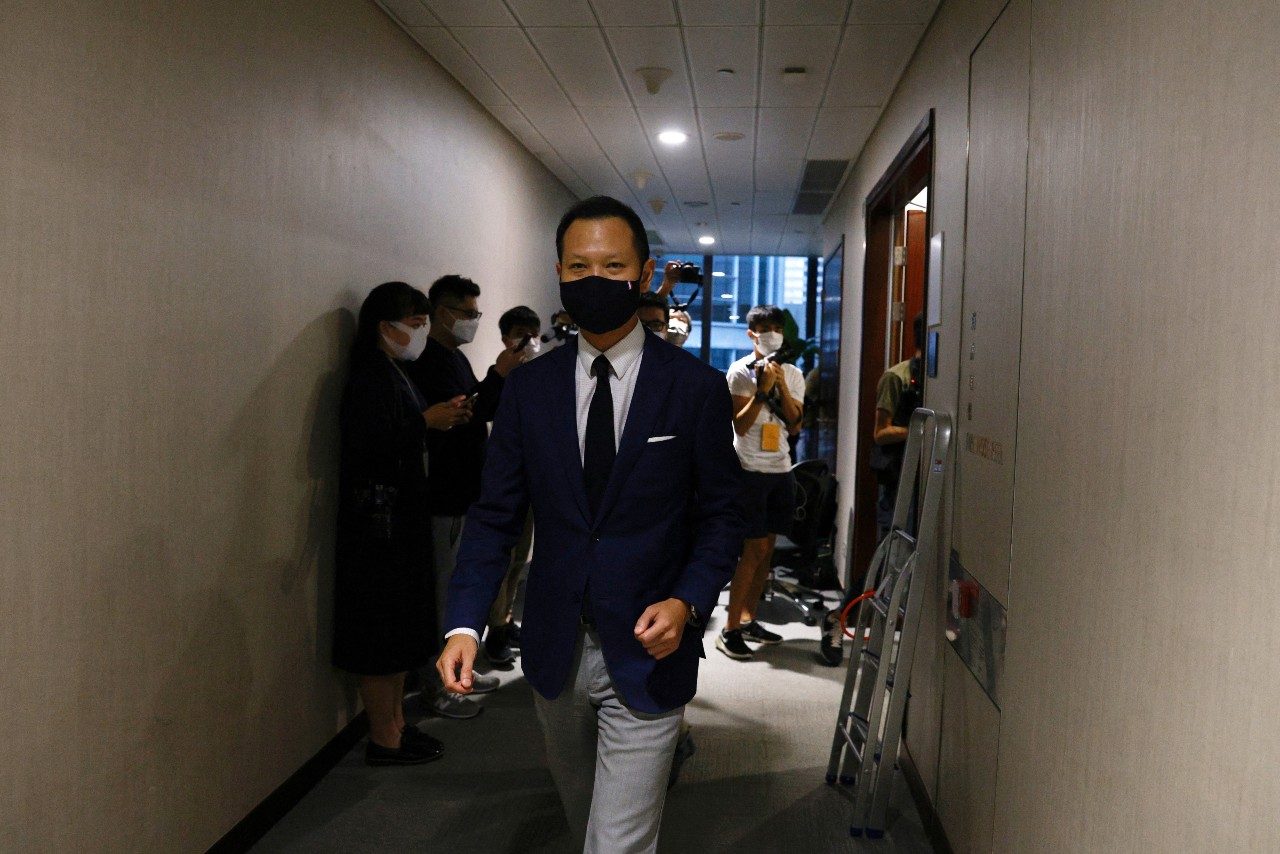
HONG KONG – Anonymous threats sent by text message and email. GPS tracking devices placed under a car, and Chinese “funeral money” sent to an office. Ambushes by reporters working for state-controlled media. Accusations of disloyalty in the press.
These are some of the methods deployed in a campaign of intimidation being waged against lawyers in Hong Kong who take on human rights cases, have criticized a China-imposed national security law or raised alarms about threats to the rule of law. While some of Hong Kong’s leading rights lawyers have been detained in the past two-and-a-half years, many others have become the target of a more insidious effort to cleanse the city of dissent – part of a wider crackdown by the ruling Communist Party on lawyers across China, say activists, legal scholars and diplomats.
Michael Vidler, one of the city’s top human rights lawyers, is among them. Vidler left Hong Kong in April, a couple of months after a judge named his law firm six times in a ruling that convicted four pro-democracy protesters on charges of illegal assembly and possession of unauthorized weapons. Vidler interpreted the judgment as “a call to action” on the city’s national security police “to investigate me,” he told Reuters in an interview last month in Europe. He asked that his location not be disclosed.
The event that precipitated his hasty departure, Vidler said, was the appearance of articles in the state-backed media in Hong Kong about him. One said he was the representative of an “anti-China” group. Within days, the British national left his home of three decades.
Vidler tried to make an inconspicuous exit. He sent a suitcase to a friend before flying out. On the day of departure, he met the friend with the suitcase and went to the airport. But on arriving, reporters from state-backed media outlets were waiting.
They “descended on me as a mob at the check-in counter, taking photos of my travel documents,” Vidler said. His last-minute flight plans were known only to his wife, the airline, and immigration authorities, he said, which “clearly shows that this information was provided by official sources” to the media.
“This was in my view state-sponsored intimidation and harassment,” said Vidler, whose wife and children later left Hong Kong. A government spokesman called Vidler’s characterization of events “baseless and erroneous.”
Other high-profile departures include former Bar Association chairman Paul Harris. He left his home of decades for England hours after being called in for questioning by national security police. Harris, too, was hounded by reporters from state-backed outlets at the airport as he departed.
The intimidation is having a broad chilling effect, as less prominent lawyers also flee the city. A major catalyst is Hong Kong’s national security law, which was imposed in June 2020, after a wave of anti-government protests shook the city the previous year. The law includes life sentences for vaguely worded offenses such as subversion, secession, and collusion with foreign forces. Facing or fearing prosecution under the law, or concerned about threats to Hong Kong’s freedoms, many lawyers and legal academics have quietly departed, mostly to Britain, Australia, and North America.
One Hong Kong solicitor who has relocated to England told Reuters that she knew of at least 80 Hong Kong lawyers who had moved to Britain since the security law was imposed in June 2020. Another lawyer, now living in Australia, estimated that several dozen Hong Kong lawyers had moved there.
Some are preparing for the possibility they may never return. Kevin Yam, a commercial solicitor and now vocal critic of Beijing’s crackdown in Hong Kong, said he took his mother’s ashes with him when he departed for Melbourne in April. “I wanted to be fully prepared, given the way Hong Kong is going,” Yam said. “If I couldn’t ever get back to Hong Kong, I didn’t want to leave her there.”
Spread to Hong Kong
Since Chinese leader Xi Jinping came to power a decade ago, the ruling Communist Party has intensified its persecution of human rights lawyers and legal activists on the mainland. Prominent rights lawyers there, including Ding Jiaxi and Xu Zhiyong, are among hundreds who have been detained, harassed, and jailed.
This suppression spread to Hong Kong in the aftermath of the city’s sometimes violent anti-government protests in the second half of 2019. Martin Lee, Margaret Ng, and Chow Hang-tung are among the veteran human rights lawyers who have been arrested.
City leaders deny that a purge of the profession is under way.
“There is no truth in the alleged harassment or intimidation of ‘human rights’ lawyers” by the government, the Hong Kong Chief Executive’s Office said in response to questions from Reuters. “We dispute and strongly object to your highly suggestive questions and biased, baseless, and false accusations against the Hong Kong National Security Law (NSL) and law enforcement actions taken by law enforcement agencies.”
In the case of Vidler, the Chief Executive’s Office said, the judge had not suggested “that a lawyer could be guilty of a criminal offense by providing legal services.”
Any actions by law enforcement were “strictly in accordance with the law” and had nothing to do with a person’s “political stance, background, or occupation,” the office said.
Asked about Vidler’s alarm over the ruling that cited his law firm, the Judiciary said it “does not comment on court judgments” and that judges do not “make public comments on their judgments.” Any suggestion of “inappropriate conduct” by a judge, it said, could only be made “when supported by solid grounds and evidence. Surmise and innuendo fall far short of what is required.”
In Beijing, the State Council Information Office and Hong Kong and Macau Affairs Office did not respond to questions from Reuters.
For this article, Reuters interviewed more than 50 lawyers and legal academics in Hong Kong and abroad.
Hong Kong’s lawyers have been a thorn in Beijing’s side since the former colony’s handover from the British in 1997. As a profession, lawyers have taken to the streets in six silent marches since the handover, in protest at what they perceived as threats to the city’s legal system and freedoms. Lawyers were also prominent figures in the mass public demonstrations against proposed national security laws in 2003, the pro-democracy Occupy Central protest movement in 2014 that paralyzed parts of the city, and the rallies in 2019 following the government’s bid to introduce laws allowing the extradition of criminal suspects for trial on the mainland.
Hostile coverage
A key target in the campaign of intimidation has been the two legal professional bodies that represent and regulate Hong Kong’s legal fraternity – the Law Society and the Bar Association. Mainland officials have long sought influence over these two influential bodies, according to senior Hong Kong lawyers.
Unlike China or the United States, Hong Kong has a British-style split legal system, in which barristers serve as advocates in courts and solicitors deal directly with clients. When necessary, solicitors hire barristers to represent clients in court or provide specialist legal advice.
The Law Society represents the city’s solicitors and has more than 13,000 members. The Bar Association represents Hong Kong’s 1,600 barristers. By law, the two bodies regulate their professions, with the power to qualify barristers and solicitors. By convention, both recommend who represents the professions on the Judicial Officers Recommendation Commission, a panel that appoints and promotes judges.
For several weeks last year, a hotly contested election for the Law Society’s governing council became the arena in which the intimidation campaign played out. The target: a group of four candidates, the so-called “liberals,” who believed the Law Society should take a stand on issues including freedom of speech, judicial independence and the rule of law. They were opposed by a group of candidates, the so-called “professionals,” who believed the body should focus more narrowly on its role in regulating solicitors while expanding business ties with the mainland.
The “liberals” already held seven seats on the 20-member council. If they prevailed among the city’s solicitors, they would be in the majority.
A barrage of hostile coverage by pro-Beijing media outlets in Hong Kong and official pressure was unleashed on the liberal group.
In the days leading up to the August election, the Hong Kong leader at the time, Carrie Lam, issued a warning at a news conference: If the Law Society got involved in politics, the government would consider cutting ties with the body. The threat implied that the Law Society would lose its role as part of the administration of justice in the city, multiple lawyers in the city told Reuters. The People’s Daily, the official mouthpiece of the Communist Party, called on the Law Society not to become a “politicized group.”
In the weeks ahead of the election, Reuters tallied more than 30 articles and editorials attacking the liberal candidates in pro-Beijing media outlets in Hong Kong. They were accused of being “independence advocates” for Hong Kong and having “ulterior political goals.”
At the same time, at least one member of the liberal group was receiving anonymous threats. Three days before the election, Jonathan Ross, a commercial lawyer, announced publicly he was pulling out of the race, citing personal risks. Ross told Reuters he had received anonymous threats via WhatsApp.
Henry Wheare, a solicitor specializing in intellectual property law who was one of the liberal candidates, said he didn’t receive any threats but that the media allegations leveled at him and the other liberals were a “complete lie.” Another member of the group, Denis Brock, a commercial lawyer, did not respond to a request for comment.
It is unclear if the pressure swayed the city’s solicitors, but on August 24, the liberal ticket was soundly defeated. All five lawyers in the professionals group were elected, giving them a clear majority on the council.
Law Society President C.M. Chan said all elections for the body’s governing council, including the 2021 election, were conducted “in a fair and transparent manner.” The Law Society, he said in response to questions from Reuters, “has spoken up in the past and will continue to speak up in future to defend the rule of law and to uphold the integrity and independence of our judiciary.”
Hasty departure
The Bar Association, which traditionally has been more outspoken on rule-of-law issues, faced even more intense criticism by Chinese officials and the state-controlled media. One target of the pressure was Harris, its chairman and a veteran human rights lawyer.
Before he became head of the Bar, Harris had been vocal on social media. “China’s determination to crush Hong Kong is a sign of weakness, not strength,” he tweeted a month before the National Security Law was imposed. “The regime knows it is illegitimate and unpopular and the contagion of criticism is spreading. But being weak is likely to make it even more cruel than before, if that is possible.”
After the law was imposed, Harris tweeted again on July 1: “I, a Hong Kong permanent resident and British citizen, can now be seized in the street by Mainland agents, taken to the Mainland and never heard of again, with no legal redress.”
After becoming Bar chairman in January 2021, Harris was more restrained in his criticism of the authorities. But shortly after he was elected, he held a press conference where he made relatively restrained criticism of the national security law. He said he hoped to “explore” if there was any chance the government would agree to some “modifications” that would make the law consistent with Hong Kong’s existing laws and legal protections.
Beijing unleashed a barrage of criticism. China’s top representative body in Hong Kong, the liaison office, accused Harris of unprofessional conduct, personal arrogance, and ignorance. The office said the security law could not be challenged.
In April last year, then-city Chief Executive Lam threatened to intervene in the Bar Association if there were “instances or complaints about the Bar not acting in accordance with Hong Kong’s law.” In August, the People’s Daily described the Bar as a “running rat.”
Under sustained criticism, Harris didn’t seek a second term as Bar chairman when his term ended in January this year. Nevertheless, a few months later, on March 1, he was summoned to a police station and interviewed by national security police. Within hours of his interrogation, Harris left Hong Kong for England, where he now resides. Photographers and reporters from pro-Beijing newspapers were waiting for him when he arrived at Hong Kong airport that evening. One of the outlets published a video of his departure.
The Bar Association did not respond to questions from Reuters.
Asked about the campaign of intimidation against lawyers, including the cases of Vidler and Harris, the Hong Kong police said the department did “not comment on individual cases.” Carrie Lam and the liaison office did not respond to requests for comment.
Tracking devices
Harris’s exit was a clear message to his fellow barristers, said Eric Lai, a legal academic who left Hong Kong in 2020. “It shows that if you openly disagree with the authorities, you will be harassed, not just by the media, but also by the authorities,” said Lai, now a non-resident fellow at the Georgetown Center for Asian Law in Washington, D.C.
The pressure has worked. Once ready to challenge the authorities on legal issues, the Bar Association has fallen silent on the national security law’s radical reshaping of Hong Kong’s legal and political system, according to lawyers and human rights campaigners. The association said nothing about the circumstances of Harris’ departure.
A review of press releases published on the Bar Association website shows that since January this year, the Bar has made no critical comments on the national security law. The law has been widely condemned by international legal bodies and rights groups including the United Nations Human Rights Committee.
“The Bar Association used to be critical of government actions, issuing statements on legal reforms and other legal issues,” said longtime Hong Kong human rights activist Patrick Poon, now a visiting researcher at the Institute of Comparative Law at Meiji University in Tokyo. “Nowadays you don’t see those statements any longer,” said Poon, who left Hong Kong after the security law was introduced.
Lawyers who served in Hong Kong’s Legislative Council have also been targeted.
Barrister and former lawmaker Dennis Kwok told Reuters he received threats before abruptly departing Hong Kong in November 2020. He said he is now working at a boutique law firm he set up in New York and is a senior research fellow at Harvard University’s Kennedy School.
A prominent pro-democracy activist, Kwok was hit with sustained criticism from mainland authorities and pro-Beijing figures for his role in employing a filibuster to paralyze the city’s Legislative Council and block legislation opposed by pro-democracy lawmakers. He was also denounced for meeting top US officials and lawmakers on a visit to Washington in early 2019.
In mid-2020, Kwok found GPS tracking devices under his car “twice in one week,” he said. He provided Reuters with a picture of one of the devices – a small, black rectangular case containing a SIM card to relay positioning data to another device.
Threats were delivered to his office, he said. On one occasion, Chinese “funeral money,” fake paper money sometimes burned by the graveside in a folk tradition, was sent to his office with a note, Kwok recalled. “‘You will be needing these very soon,’ the note read,” he said.
In November 2020, Kwok and three other pro-democracy lawmakers were ousted from the Legislative Council after China’s parliament ruled that sitting members could be disqualified if deemed a threat to national security. That month, Kwok quietly slipped out of Hong Kong. He said articles in the pro-Beijing press, calling for his arrest and accusing him of being a foreign agent, also spurred him to leave.
“After they disqualified me,” he said of the Chinese parliament’s move to oust him, “it was very clear the writing was on the wall.” – Rappler.com
Add a comment
How does this make you feel?
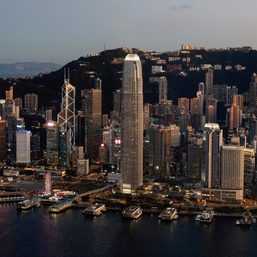
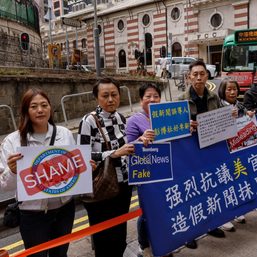
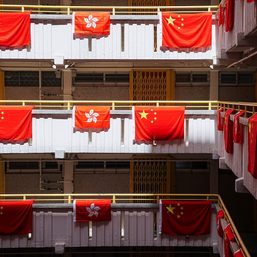
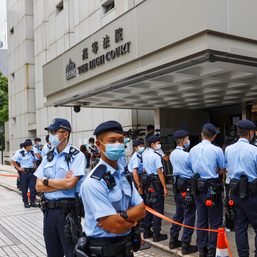
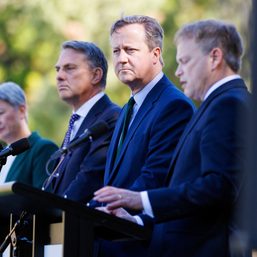
There are no comments yet. Add your comment to start the conversation.